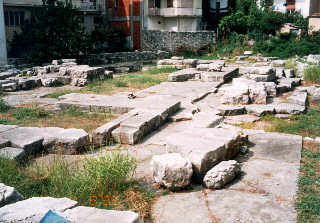

This
is the most important sanctuary of ancient Ambracia, dedicated to Apollo Pythios,
the Soter. The temple is located in the centre of the modern city of Arta. It is
peripheral, in Doric order (measuring 20.75 x 44 m.), with a pronaos and a
longitudinal sella ,
inside which was found the base of the statue or the symbol of the god
worshipped. The temple is preserved to a very small height (up to the
euthenteria), because it
was used as a quarry in the Early Christian period.
The
monument is dated to ca. 500 B.C. on the basis of its pores architectural parts.
In the Early Christian period the area was occupied by vaulted tombs and was
later used as a quarry.
,
inside which was found the base of the statue or the symbol of the god
worshipped. The temple is preserved to a very small height (up to the
euthenteria), because it
was used as a quarry in the Early Christian period.
The
monument is dated to ca. 500 B.C. on the basis of its pores architectural parts.
In the Early Christian period the area was occupied by vaulted tombs and was
later used as a quarry.
The
temple was discovered in 1964 and was then excavated for the first time by J.
Vocotopoulou. The excavation was continued in 1966 and 1968 and completed in
1975-1977.
It
is the first nearly complete temple still surviving, with for the first time,
all three architectural styles: Doric, Ionian and Corinthian. The temple was
erected on a raised area, 1,131m, called the 'Bassai', meaning little vale in
the rocks.
It is a Doric peripheral temple made from local limestone, and consists of a
prodome and a cella. It is orientated north to south. In the cella there was a
column with a Corinthian capital, which is the oldest known example of its kind.
The
temple was decorated with a marble sculpted frieze depicting the battles between
the Amazons and the Centaurs. The frieze's marbles have been looted by the
British and can now be found in the British Museum.
The temple, work of Ictinos architect of the Parthenon, is dated at ca. 420 B.C.
It was built over an older temple, by the inhabitants of Figalos in honour of
Epicurean Apollo, gratitude for saving them from a plague. The name Epicuros was
given to Apollo ca. 650 B.C., during the wars against the Spartans
In
1902, the 1st Archaeological society of Athens began systematic archaeological
research of the area, under the direction of K.Kourouniotis, with the assistance
of K.Romaios and P.Kavvadias. It was continued in 1959, 1970 and from 1975-1979,
under the direction of N.Gialouris.
Small scale restorations have been carried out by the civil engineer N.Balanos
and professor H.Bouras. More recently, research has been completed, by the
Committee of the Temple of Epicurean Apollo, for the restoration of the temple.
At the present time conservation work on the temple is being done under the
supervision of the Committee of the Epicurean
Holy Land Greece Pilgrimages Pilgrimages Map Index Espaņol English Index